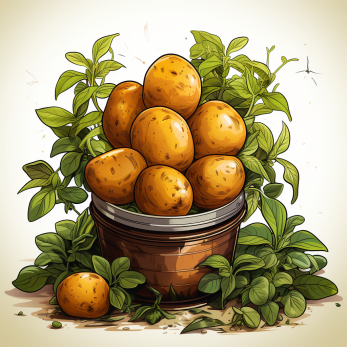
Potatoes are a staple in many households worldwide. They’re versatile, delicious, and can be stored for long periods when kept in the right conditions. But what happens when you discover those little green shoots, or "eyes", sprouting from your stored potatoes? Does it mean the potato is past its prime? Can you still eat sprouted potatoes? Let's delve into the science and safety of consuming sprouted potatoes.
1. What Causes Potatoes to Sprout?
Potatoes sprout when they start to prepare for new growth. Sprouting, also known as chitting, is a natural process that occurs when the potato is exposed to light and warmth. It’s the potato's way of saying it’s ready to plant and grow into a new potato plant.
Takeaway: Sprouting is a potato's natural growth response, typically triggered by the environmental conditions they're stored in.
2. The Concern: Solanine and Other Glycoalkaloids
The main concern with sprouted potatoes is the potential increase in glycoalkaloids, toxins that can be harmful when ingested in large amounts. The most common glycoalkaloid in potatoes is solanine, which can be harmful if consumed in large quantities.
Symptoms of solanine poisoning include:
- Nausea
- Vomiting
- Diarrhea
- Stomach cramps
- Neurological symptoms
Takeaway: The sprouting process can increase the levels of harmful compounds in potatoes, making them potentially unsafe to eat in large amounts.
3. Greening of Potatoes
Often accompanying the sprouting process is the greening of the potato's skin. This green color is chlorophyll, a harmless compound. However, the presence of chlorophyll can indicate higher levels of solanine.
Takeaway: The green color on potatoes is not harmful, but it can be a sign of increased solanine, which is toxic.
4. Can You Still Eat Them?
You can still eat sprouted potatoes if they are firm to the touch and they don't look too shriveled or wrinkly. However, there are precautions you should take:
Remove Sprouts and Green Areas: Always remove the sprouts and any green parts before cooking or eating the potato.
Taste: A bitter or off taste can be a sign of increased solanine. If a potato tastes bitter, it's best to discard it.
Cooking: Cooking will not remove glycoalkaloids, so ensure you've properly prepped the potato before cooking.
Takeaway: Sprouted potatoes can be eaten safely if they're still firm and any sprouts or green parts are removed. Always trust your taste buds.
5. Storing Potatoes to Prevent Sprouting
To maximize the shelf life of your potatoes and prevent sprouting:
- Store them in a cool, dark, well-ventilated place.
- Avoid storing them in plastic bags. Instead, use paper bags or mesh bags.
- Keep potatoes away from other fruits and vegetables, especially onions, as they can accelerate sprouting.
Takeaway: Proper storage can prolong the life of your potatoes and prevent premature sprouting.
6. The Bottom Line
While sprouted potatoes can increase in glycoalkaloid content, they can still be safe to eat when prepared correctly. Always ensure they are firm, remove any sprouts or green areas, and trust your senses. When in doubt, especially if the potato tastes bitter or off, it's better to be safe and discard it.
Sources:
- PennState Extension - Are Sprouted Potatoes Safe to Eat?
- Healthline - Green Potatoes: Harmless or Poisonous?
- Food Safety Information - Potatoes and Glycoalkaloids
